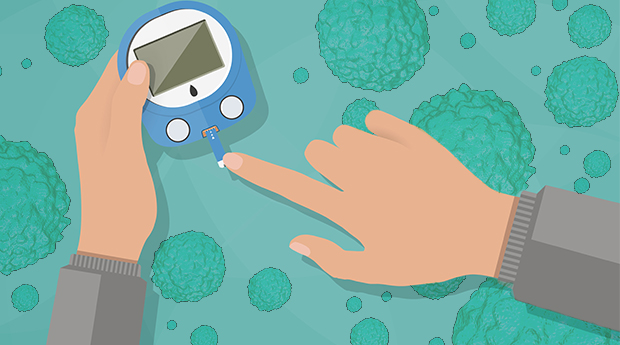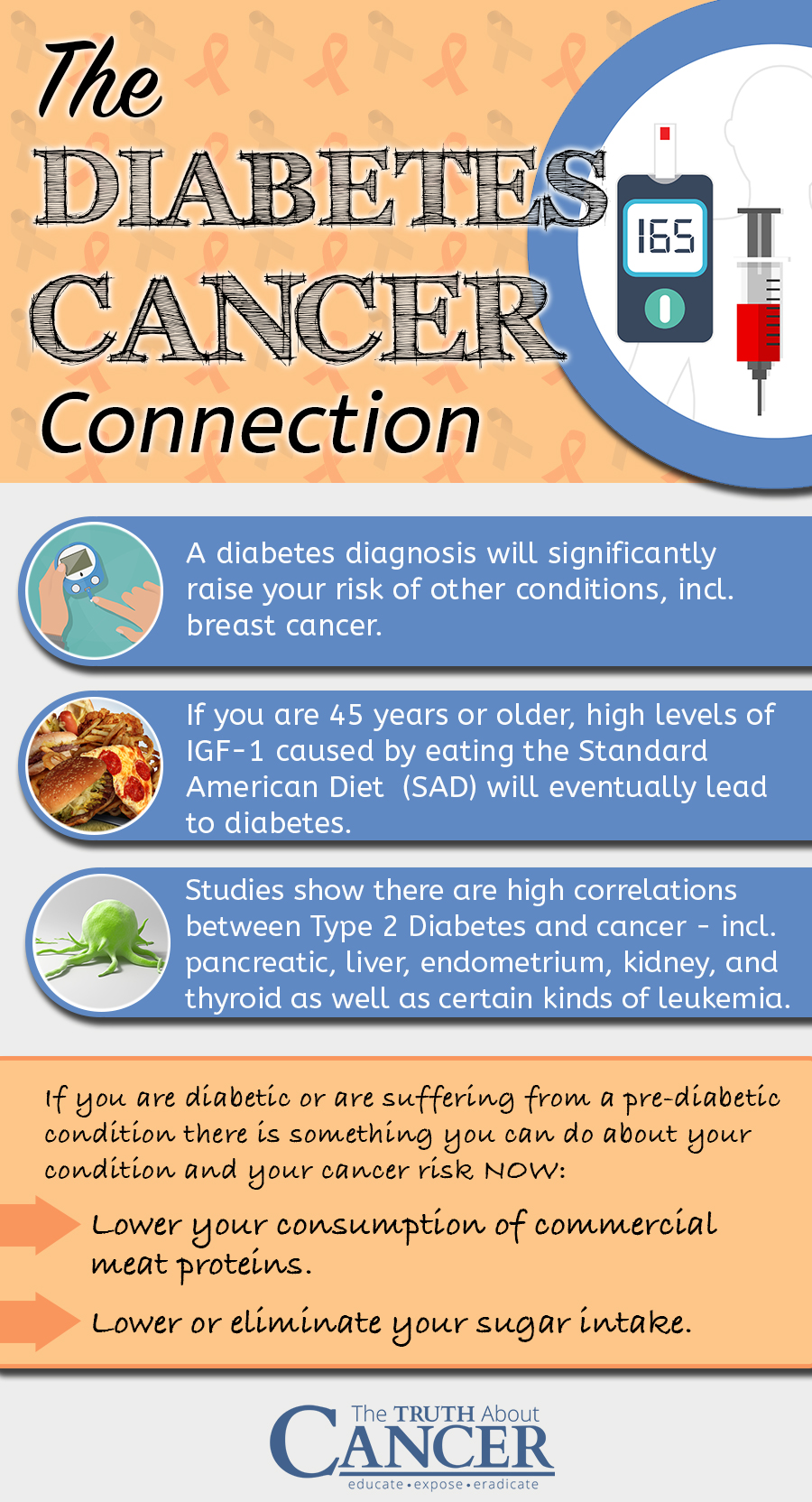Diabetes, especially lifestyle and diet-related Type 2 Diabetes, has reached epidemic proportions in the United States. And sadly not just for adults, but for children and teens as well. This is not breaking news.
Still, the statistics can be scary. Close to 10% of the U.S population have been diagnosed with the disease and an estimated additional 8.1 million Americans went undiagnosed in 2014, according to the Centers for Disease Control. This includes close to 4,000 new cases of Childhood Type 2 Diabetes each year (something that was unheard of just 15 years ago). And these statistics do not even include the 40% of Americans who, according to the CDC, may be deemed pre-diabetic.
The Connection Between Diabetes and Cancer Is Real
A study of close to one million people registered with the national Diabetes Service Scheme (NDSS) in Australia who were diagnosed between the years 1997 to 2008 discovered that there were high correlations was between Type 2 Diabetes and cancer. Specifically, these include pancreatic, liver, endometrium, kidney, thyroid and gallbladder cancer as well as certain kinds of leukemia. A 2014 report by the World Journal of Diabetes found that high correlation also existed between Type 2 Diabetes and breast cancer as well.
Increasing rates of both diabetes and cancer over the last decade has led scientists to try to determine the specific chemical and biological connections between the two diseases. For years, conventional wisdom stated that obesity was the common cause. Now more evidence points to factors related to insulin instead.
There are a few connections between insulin levels and cancer. First of all, studies have shown that tumors have a high number of insulin receptors. This makes sense since cancer loves sugar. In fact, sugar is often called “white death” since it and its toxic byproducts are cancer’s main source of fuel.
The other connection has to do with a little-known protein whose structure is similar to insulin called Insulin-Like Growth Factor 1 (IGF-1). IGF-1 is produced by the liver as a hormone; its main job is to promote cell growth. IGF-1 is essential for the developing bodies of children but becomes problematic for adults. IGF-1 can cause cancerous cells to become “immortal” and, as we shall see below, the causal factors for its overgrowth are exactly the same as that for diabetes.
Women with High Levels of IGF-1 are More Likely to Get Breast Cancer
High blood sugar levels (i.e. diabetes and pre-diabetic conditions) as well as high IGF-1 levels have been linked to higher breast cancer risk and mortality in several recent studies:
- A 2014 study conducted by the German Cancer Research Center and published in the International Journal of Cancer found a distinct correlation between high amounts of IGF-1 proteins and increased risk of ER-positive breast cancer. Specifically, they discovered that there is a noticeable communication between IGF-1, estrogen hormones, and their receptor sites in mammary tissue;
- A study published in a 2013 edition of the European medical journal Tumori found that IGF-1 activates other proteins that may, in turn, stimulate mammary tumors;
- A 2014 Russian study found that IGF-1 further suppresses the immune systems of postmenopausal breast cancer patients;
- IGF-1 has been linked to “dense breast syndrome” in several studies. Women with excessive tissue in the mammary glands are at higher risk for breast cancer;
Finally, there is a connection between insulin levels themselves and breast cancer. One of the largest studies to make this connection was a joint effort conducted by the Cancer Prevention Research Unit at McGill University in Montreal, Canada, the University of Massachusetts Medical School, and the University of Colorado, School of Medicine.
Researchers examined insulin levels for over 600 postmenopausal breast cancer patients at the time of diagnosis and then 10 years later. The team found a definite correlation between the highest amounts of insulin in the blood and increased risk of breast cancer. They also made the connection between obesity and higher risk of breast cancer recurrence.
2 Things You Can Do NOW to Prevent Diabetes and Breast Cancer
There is no doubt that insulin imbalance, high amounts of IGF-1, and breast cancer risk are intricately linked. What is the common factor between all three? You guessed it: lifestyle and diet. This is good news if you are diabetic or are suffering from a pre-diabetic condition because it means there is something you can do about your condition and your cancer risk NOW:
- Lower your consumption of commercial meat proteins. A study published in the journal Cell Metabolism found that adults in their middle years who have a high rate of commercial meat consumption also had high levels of IGF-1 in their system. Interestingly, those between the ages of 45 and 64 are most likely to be diagnosed with Type 2 Diabetes, according to the CDC. If you eat meat, your portion should be the size of a deck of cards. And be sure to eat organic, free-range meats only!
- Lower or eliminate your sugar intake. Refined carbohydrates (including commercially-produced refined wheat breads and pastas) can overstimulate production of IG-1 proteins. The correlation between reduced sugar intake and improvement in diabetic conditions is well documented. And according to a study done through the UCSD Cancer Center, reducing your carb intake may also reduce your risk of breast cancer recurrence too. In this study, the amount of IGF-1 protein expression was the common factor between sugar intake and cancer recurrence.
If you are an adult 45 years or older, high levels of IGF-1 caused by eating the Standard American Diet (SAD) will eventually lead to diabetes. It will also lower your immune system function and raise your risk of breast cancer, breast cancer recurrence, and other cancers as well. Research has proven that this is the case whether or not you are obese.
Here is the tragic news… cancer patients who also have diabetes have higher cancer mortality rates. The GREAT news is… this is a situation that you can do something about NOW. Change the way you eat to a healthy breast diet and see the results in improvement for your diabetes as well as in a lower risk of cancer.
Please help bring more awareness about the diabetes and cancer connection (and steps to take now) by sharing this article with your friends and family below.
Article Summary
Diabetes, especially lifestyle and diet-related Type 2 Diabetes, has reached epidemic proportions in the United States. Not only for adults, but for children and teens as well.
A large Australian study discovered there were high correlations between Type 2 Diabetes and cancer. The types of cancer linked to diabetes include pancreatic, liver, endometrium, kidney, thyroid and gallbladder cancer, certain kinds of leukemia, as well as breast cancer.
High blood sugar levels (i.e. diabetes and pre-diabetic conditions) as well as high Insulin-Like Growth Factor (IGF-1) levels have been linked to higher breast cancer risk and mortality in several recent studies.
If you are diabetic or are suffering from a pre-diabetic condition there is something you can do about your condition and your cancer risk now:
- Lower your consumption of commercial meat proteins.
- Lower or eliminate your sugar intake.
If you are an adult 45 years or older, high levels of IGF-1 caused by eating the Standard American Diet (SAD) will eventually lead to diabetes. It will also lower your immune system function and raise your risk of breast cancer, breast cancer recurrence, and other cancers as well. Research has proven that this is the case whether or not you are obese.





















What is missing here is what actually causes type II diabetes. Excess dietary fat causes insulin resistance. Type II diabetes is easily cured by a low-fat plant-based diet. Excess consumption of all forms of fat causes an intracellular fat toxicity that blocks the signal from the insulin receptor. There is an excellent video on this by Dr. Michael Greger on his http://www.nutritionfacts.org website. Insulin cross-talks onto the IGF-1 signaling axis which stimulates tumor growth. Therefore, abnormally high insulin is a tumor growth factor along with IGF-1. All dairy products should be eliminated from the diet since even grass fed cows produce IGF-1 as a growth stimulant for their baby calfs. Sugar and refined carbohydrates are not the problem in diabetes and cancer. Fat is the real problem that creates insulin resistance. All animal products are loaded with fat and of the form that tends to build up as intra-myocellular lipids. An excess of oils, nuts, seeds and avocado will also play a role in creating insulin resistance. Yes, there is most definitely a relationship between cancer, obesity and type II diabetes. Fat intake is the key to understanding the relationship. The most optimal dietary foundation for treating cancer is very low fat, plenty of natural sugars from fruits and vegetables, no animal protein and no highly processed grains. This is also the most optimal diet for cancer prevention.
This change in diet does not work for everyone, and is overly simplistic. This epidemic took extreme hold when the public was propagandized to remove fat from their diet, and eat carbohydrates, which has lead to the onslaught of excess carbs based foods now grown with Glyphosate and Genetically modified, besides the other chemicals in food manufacturing that cause cravings and overeating of this food, as well as nutrient depletion. Mineral imbalance,especially the inversion of Sodium and Potassium is a root indicator of how a person’s biochemistry can actually break down a diet of non animal foods. It is complicated, not as simplified as stated above. As a Practitioner, I have seen myriads of patients Biochemical tests showing Individuality, therefore requiring individualized roadmaps. The majority of people do best with a diet consisting of a majority of vegetables and fruits for their carbohydrates, with high quality clean protein, and depending upon genetics, clean dairy, but not a majority of people can digest it properly. Besides, nature did not provide an abundant supply of B 12 without consuming at least Eggs.
It is not too surprising that children, teenagers, and young adults are getting diabetes and other health problems very young with all the junk food that they eat. The Standard American diet is not good for anyone at any age. The Standard American diet consists of too much fat, salt, and sugar which is bad for your general health. I try to avoid it as much as possible and try to eat healthy.
Anyone who served in Vietnam is automatically service-connected to diabetes because of the use of Agent Orange, the defoliant that was liberally sprayed not only on the jungle but over the military personnel as well. The VA clinics are filled with veterans that all have the same health problems, with virtually every one being diabetic.